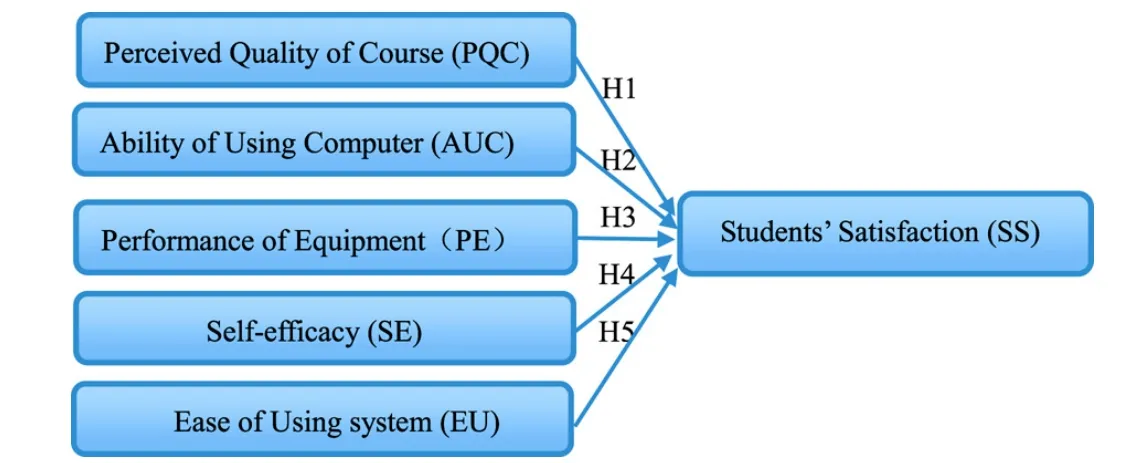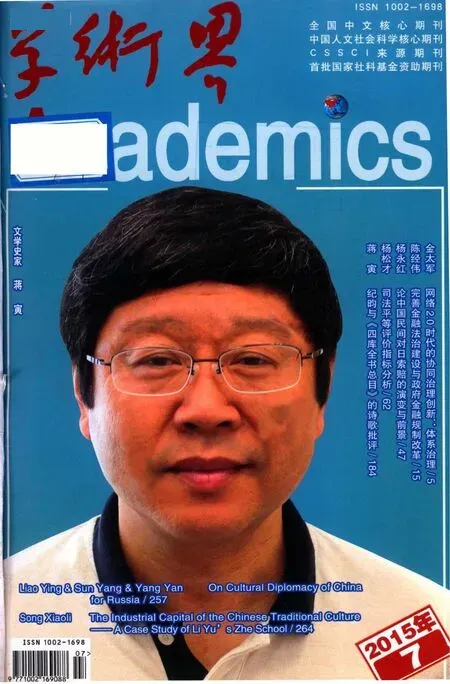Investigating Learners’Satisfaction Towards MOOC —— An Empirical Study Based on Western Ethics History Course〔* 〕
Yuan Jing,Zhai Xuesong
(1.School of Foreign Studies Anhui Sanlian University,HefeiAnhui230001;
2.School of Foreign Studies Anhui Jianzhu University,HefeiAnhui230001)
Ⅰ.Research background and hypotheses
1.Theory framework
Constructivism study theory is a teaching and study theory developed from the 1990s and propelled by information technology.Constructivism study theory accelerates the teaching reform for its emphasizing on constructiveness of knowledge.Teaching method should be designed based on partaking in the process of learning,and constructivism study theory proposed the information technology as cognitive tool of ideal learning environment could promote students’cognitive development.Therefore,this paper choose ability of using computer and performance of equipment as important variables toward learners’satisfaction.
Social cognitive theory(Bandura,1991)is widely used in the field of psychology,education,and communication,〔1〕which states that portions of an individual’s knowledge acquisition can be directly connected with observing others’within the context of social interactions,experiences,and other media influences.According to this theory,human behavior is mainly regulated by the ongoing exercise of self-influence.Self-efficacy plays a critical role in the process of MOOC learning by its significant influence on thought,motivation,and action.Thus,the self- efficacy is chosen to be a variable in this study.
The technology acceptance model(TAM,Davis,1989)is an information systems theory that models how users come to accept and use a technology.〔2〕It proposes that two variables,perceived usefulness and ease of use,are the important elements for technology acceptance.Considering some tech -supported teaching methods,including online course,interactive platform,online test,were used for MOOC,we adopted perceived quality of course and ease of using MOOC system as vital variables to test learners’satisfaction.
2.Research hypotheses and model
The quality of well-designed e-learning program is the primary factor for learners when using MOOC.The virtual characteristics of online learning,which including online interactive discussion and brainstorming,multimedia presentation for course materials,as well as management of learning process,assist learners in establishing learning model effectively and motivating continuous online learning(Piccoli,2001).〔3〕We thus hypothesize the following.
H1:Perceived quality of course positively influenced users’satisfaction.
Many research indicate that learners’attitude towards computer is a significant factor on E - learning satisfaction(Arbaugh,2002).〔4〕In the IS domain,computer self-efficacy means the self-assessment of individual ability and skills to use computer to finish specified task.Computer self-efficacy plays an important role in terms of its effect on perceived ease of use and perceived usefulness,because the confidence of using computer can influence their assessment of the ease or difficulty of executing a specific task,and how useful that computer will be.We thus hypothesize the following.
H2:Ability of using computer have significant influence on MOOC satisfaction.
Moreover,much research indicate that technology quality and internet quality significantly affect satisfaction in online learning,therefore,users commonly prefer adopting simple and convenient software tool.An empirical re-search undertaken by Webster and Hackley showed that quality of technology and network transmission speed significantly influence learning effects.〔5〕A-bove all,in this research,we proposed the following hypothesis:
H3:performance of equipment will positively influence students’satisfaction to MOOC.
In addition,self- efficacy is an individual’s belief in one’s capability to perform a particular task or behavior.The strength of their effectiveness beliefs play a critical role in whether people will make an effort to handle given situations.Self- efficacy is expected to affect various learning cognition or behavior.Learners with higher efficacy expectations have more study motivation and creation in a given task.Many research have frequently indicated that the higher the induced level of self-efficacy,the greater performance attainments is(Bandura,1991).〔6〕We thus hypothesize the following.
H4:individuals’self- efficacy have significantly influence on students’satisfaction towards MOOC.
The both the rate of participation and degree of satisfaction towards online learning are facilitated due to the flexibility of learning time,space,and operating method.What’s more,less physical barriers enable more dynamic interaction that foster establishment of constructive(Brandon&Hollingshead,1999).〔7〕Students can communicate flexibly,since there are no restrictions on time and space in MOOC.Therefore,we propose the following hypothesis,and construct the proposed model as figure1.
H5:Ease of using MOOC system will positively influence satisfaction.

Figure 1 The hypothesized model of students’satisfaction towards MOOC
Ⅱ.Methodology
1.Participants
The sample for the study was taken from English majors who participated in Erya general course in the continuing education program of Anhui Jianzhu university.A total of 70 questionnaires were distributed to students who complete the Western Ethics History course.A total of 66 valid surveys were returned(the percentage of valid surveys is 94%).The sample was comprised of 67%female and 33%male students.The researcher reminded students of the purpose of this study and explained the steps for completing the questionnaires.All respondents were asked to respond to the survey and their responses were guaranteed confidentiality.In order to maximize the response rate,some small gifts were provided to the sample students with the survey.
2.Procedure
The current survey took Western Ethics History from Erya MOOC general course as an sample class including 31 lesson periods.Firstly,after finishing one period,learners have to do corresponding homework to consolidate the key points.Then,the system would correct their homework and provide answers for learners in details.Secondly,the system would supply related electronic books,such as The Social Contract and Republic,to learners for promoting deep understanding.Learners can download it for offline reading to enlarge their horizon.Thirdly,the online interaction can be conducted between teachers and learners clear through interactive platform or social media tools,and there will be a test after finishing the whole courses.
3.Instrument
The questionnaire in this research are 5 degrees scale from 1-extremely disagree,2 - disagree,3 - neutral,4 - agree,to 5 - extremely agree.In order to develop a valid and reliable survey,the following steps were undertaken.
In the first place,to ensure the validity and reliability of the scale,the survey instruments used for this study is based on several tested scales.Items for perceived quality of course and ability of using computer were adopted from prior work by Tasi,C.C.,LinS.S.J.& Tsai,M.J.〔8〕The reliability(cronbach’s α)for perceived quality of course and Ability of using computer are 0.82 and 0.71,respectively.This results showed that these factors had sufficient reliability for measuring students’satisfaction.To measure the influence of self- efficacy towards learners’satisfaction,we inferred the scale developed by Cheng,K.H.,Liang,J.C.,& Tsai,C.C.〔9〕The Conbach’s α value of the questionnaire was 0.85,which indicates this scale measuring selfefficacy had a good reliability.Furthermore,we piloted the first version of the instrument on students for the survey and asked two experienced professors to judge the validity of survey.
Ⅲ.Data analysis and results
SPSS 19.0 was used to analyze collected data for this research.Firstly,the reliability and validity of the measuring instruments were evaluated.Cronbach’s α was calculated for each scale to ensure internal consistency.Table1 presents factor loading and cronbach’s α of the measures,and each α value is bigger than 0.5 suggesting acceptable reliability.Additionally,all of the factor loadings are greater than 0.50 as well as the t-values reveal significance at the 0.001 level,indicating strong relationship with their associated constructs.

Table 1 Loadings,Cronbach’s Alpha(α)of questionnaire
Table 2 shows the inter-correlation among the variables.The correlation between Students’Satisfaction and PQC,EU,PE are 0.42,0.49 and 0.46,respectively.Due to their close relationship to satisfaction,ease of using MOOC system was the most significant factor,followed by scores on the performance of equipment and perceived quality of course.Thus,we can safely draw a conclusion that perceived quality of course,ease of using MOOC system and performance of equipment have close relationship with sample students’satisfaction towards MOOC.

Table 2 Descriptive analysis and correlation
Regression analysis was used to explain the causality between students’satisfaction and each independent variable.According to table 3 self-efficacy(t=1.15)isn’t statistically related to satisfaction.Whereas perceived quality of course(t=3.96),ease of using system(t=3.28)and performance of equipment(t=3.96)were positively related to learners’satisfaction toward MOOC.Surprisingly,perceived quality of course(t= -2.17)posed a significant negative effect on learners’satisfaction to MOOC.

Table 3 Regression analysis
Ⅳ.Discussion
As MOOC is increasingly adopted by educational communities and institutions,the formative mechanism of learners’satisfaction should be consid-ered for delivering a more effective services in the further development of MOOC.Thus,we investigated the relationships between satisfaction and five variables.From data analysis,four variables are proved to have certain relationships with MOOC satisfaction and the results presented that 43%(adjusted R=43%)of the perceived MOOC satisfaction’s variance can be explained by those four variables.
The results reinforce that either traditional face-to-face teaching method or open online learning were significantly effected by perceived quality of course.What’s more,instructors’ability and attitude on MOOC course also play critical roles on learners’satisfaction.That’s to say,instructors with less enthusiasm or negative view would not lead to high satisfaction for learners.Since their attitude and ability will affect the students’perceived quality of course and performance in MOOC course,therefore,not only instructors’professional skills but also their attitude should be deeply taken into consideration in constructing MOOC.
Besides,the flexibility of learning system has the strongest association with learners’satisfaction.Different from traditional course,this model are convenient for learner to accept online course without the limitation of time and space,and the learning system should be designed to expand the ease of using it.System designers should take advantage of some tech - supported methods,such like vedio - tag,in a coordinated manner to facilitate learners’easy understandi uipment also has positive effect on learners’satisfaction which reinforce Seddon’s research(1997)indicating that quality of information system has a positive influence on users’attitude.〔10〕
Surprisingly,in this research,student with high computer skills has less satisfaction towards MOOC.The possible explanation may attribute to learners’expectancy Dis-confirmation.In terms of Expectancy Dis-confirmation Theory,learners’judgments of course satisfaction are determined,not merely by the quality and service of MOOC,but by a process in which learners compare quality with their prior expectations.Learners with high computer skills generally have high expectation toward MOOC.The dis-confirmation drives from the difference between expectation and actual performance of MOOC.Nowadays,college students commonly have higher skills in computer operation and more experiences on internet technologies.Thus,it essentially weakens the level of customer’s satisfaction because students’learning experience may be dis-confirmed by their higher expectation.
Contrary to hypothesis 4,the results present that self- efficacy has no relationship with students’satisfaction toward MOOC.The reasons may exist as follow:The participants’purpose of learning Erya general are mostly for achieving course credit,which diluting the perception and understanding about their learning motivation.Thus the weak motivation lead students perceive little self efficacy to the MOOC study.
Ⅴ.Limitation
The findings of this study must be considered in light of its limitation.First,since our research sample only comes from English major in Anhui Jianzhu university,and this sample size was fairly small,consisting of only 66 English majors.Secondly,this research concerned merely on field of higher education but did not reflect on the perception of other study groups,such as employees or postgraduates.Finally,we limited the research variables to five factors,additional factors,such as teaching materials,hardly be measured in this survey but may influence students’satisfaction towards MOOC study.A-bove limitations reveals the empirical research of MOOC should enlarge the sample size and pursue more effective factors for preciser research in the future.
〔1〕Bandura,A.,Social Cognitive Theory of Self-regulation,Organizational Behavior&Human Decision Processes,1991,50,pp.248 -287.
〔2〕Davis & Fred,D.,Perceived Usefulness,Perceived Ease of Use,and User Acceptance of Information Technology,Mis Quarterly,1989,13(3),pp.319 -340.
〔3〕Piccoli,G.,Ahmad,R.& Ives,B.,Web - based Virtual Learning Environments:A Research Framework and A Preliminary Assessment of Effectiveness in Basic it Skills Training,Mis Quarterly,2001,25(4),pp.401 -426.
〔4〕J B Arbaugh.,Managing the On-line Classroom:A Study of Technological and Behavioural Characteristics of Web-based Mba Courses,Journal of High Technology Management Research(2),2002,pp.203 -223.
〔5〕Hackley,P.& Webster,J.,Teaching Effectiveness in Technology - mediated Distance Learning,A-cademy of Management Journal,1997,40(6),págs.pp.1282 -1309.
〔6〕Bandura,A.,Social Cognitive Theory of Self-regulation,Organizational Behavior&Human Decision Processes,1991,50,pp.248 -287.
〔7〕Brandon,D.P.& Hollingshead,A.B.,Collaborative Learning and Computer- supported Groups,Communication Education,1999,48(2),pp.109 -126.
〔8〕Tsai,C.C.,Lin,S.S.J.& Tsai,M.J.,Developing An Internet Attitude Scale for High School Students,Computers&Education,2001,37(1),pp.41 –51.
〔9〕Cheng,K.H.,Liang,J.C.& Tsai,C.C.,University Students’Online Academic Help Seeking:the Role of Self- regulation and Information Commitments,Internet&Higher Education,2013,16,pp.70 –77.
〔10〕Seddon P B.,A Respecification and Extension of the DeLone and McLean Model of IS Success,Information Systems Research,1997,8(3),pp.240 -253.

